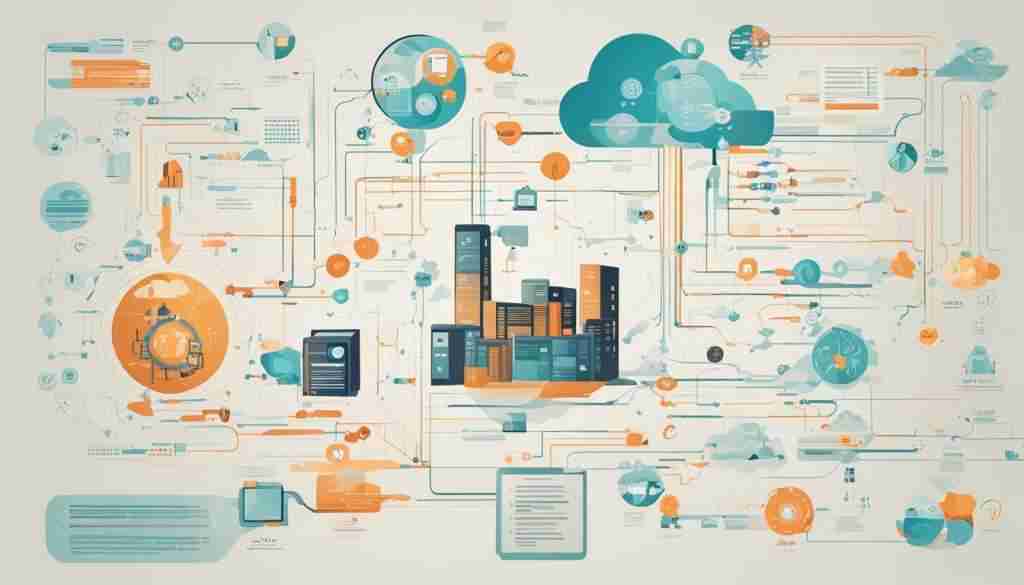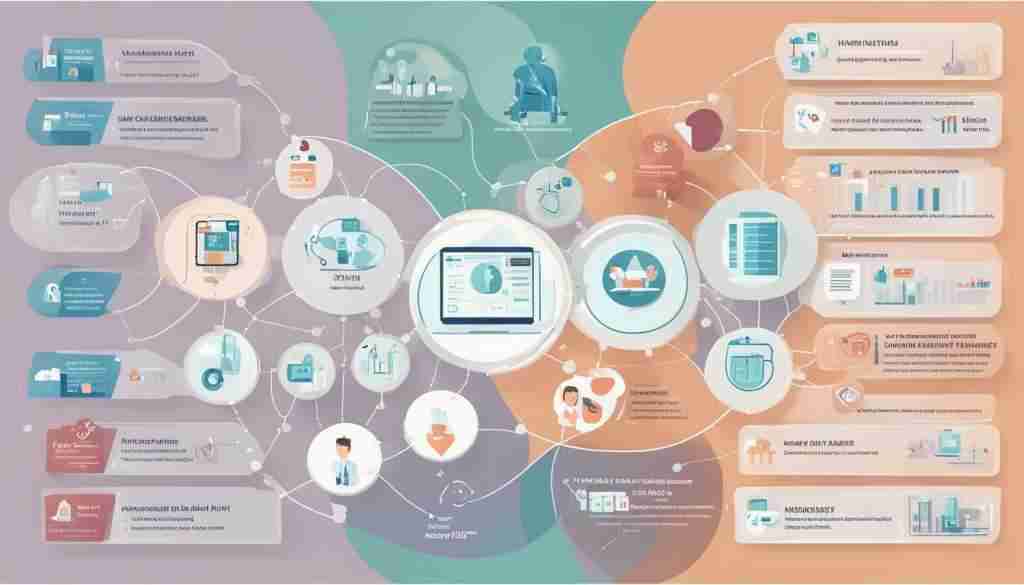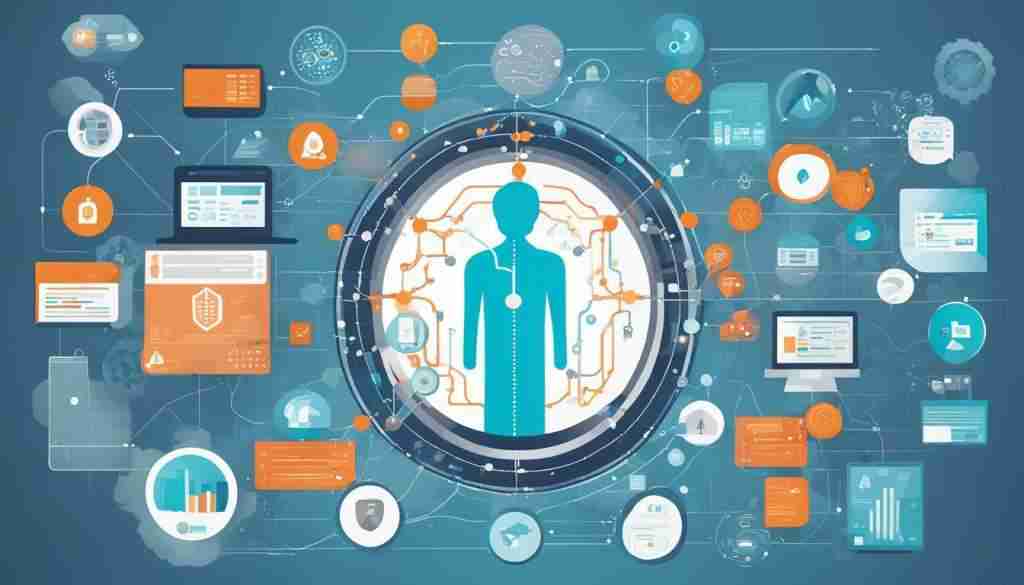Big Data Analytics and AI-Powered Healthcare are two of the most rapidly expanding technologies in the healthcare industry. The role of big data analytics in AI-powered healthcare cannot be overstated. Big data analytics and AI have the potential to revolutionize the healthcare industry, improve patient care, enable personalized treatment, and optimize healthcare management.
Healthcare analytics is an umbrella term that encompasses the use of big data analytics, artificial intelligence, and machine learning to derive meaningful insights from vast amounts of patient data. These insights can aid in predicting healthcare trends, disease outbreaks, and optimizing healthcare resource allocation. This section will explore the role of big data analytics in AI-powered healthcare, healthcare analytics, the use of big data in healthcare, the role of artificial intelligence in healthcare, AI-powered healthcare solutions, data-driven healthcare, healthcare data analytics, and AI in healthcare management.
Key Takeaways
- Big data analytics and AI have the potential to revolutionize the healthcare industry.
- Healthcare analytics encompasses the use of big data analytics, artificial intelligence, and machine learning to derive meaningful insights from vast amounts of patient data.
- The use of big data analytics in AI-powered healthcare can improve patient care, enable personalized treatment, and optimize healthcare management.
The Benefits of Big Data Analytics in Healthcare
Implementing big data analytics in healthcare comes with numerous benefits, from improving patient care and outcomes to streamlining administrative processes and managing resources efficiently. Here are some of the benefits that big data analytics brings to the healthcare industry:
1. Improved Diagnosis and Treatment Outcomes
By analyzing large volumes of healthcare data, big data analytics enables healthcare providers to identify patterns and trends that can inform diagnosis and treatment decisions. This approach can lead to more accurate diagnoses, personalized treatment plans, and improved patient outcomes.
2. Enhanced Patient Safety
Healthcare providers can leverage big data analytics to identify potential safety risks and prevent medical errors. By tracking and analyzing data such as medication orders, lab results, and patient vital signs, healthcare providers can identify and mitigate potential safety risks before they cause harm.
3. Better Disease Prevention
Data-driven insights empower healthcare providers to identify at-risk patient populations and proactively manage their health. By identifying patterns and trends in patient data, healthcare providers can predict and prevent outbreaks, reduce hospitalizations, and promote wellness.
4. Resource Optimization and Cost Reduction
By leveraging big data analytics, healthcare organizations can optimize resource allocation and reduce costs. For example, data can be used to track inventory and utilization rates, enabling organizations to make more informed purchasing and staffing decisions.
5. Streamlined Administrative Processes
Big data analytics can help healthcare organizations streamline administrative processes by automating tasks such as scheduling, billing, and claims processing. This can help reduce errors and improve efficiency, freeing up staff to focus on patient care.
6. Leveraging Healthcare Analytics
By leveraging healthcare analytics, organizations can gain insights into patient behavior, preferences, and treatment outcomes. This enables healthcare providers to develop more effective interventions and improve patient engagement.

Overall, big data analytics plays a critical role in enabling data-driven healthcare, empowering healthcare providers to make informed decisions, optimize resources, and improve patient outcomes.
Leveraging AI-Powered Solutions for Personalized Healthcare
Big data analytics and artificial intelligence (AI) are driving personalized healthcare solutions, improving patient outcomes and enabling more effective treatment plans. AI algorithms analyze patient data to identify individualized treatment plans, predict health risks, and provide personalized recommendations.
One of the most promising applications of AI in healthcare is virtual assistants and chatbots. These AI-powered technologies can augment clinical communication and provide patients with access to a wealth of information and support. They can also track vital signs, assist in telemedicine consultations, and help patients manage chronic diseases.

AI-powered wearable devices are also transforming personalized healthcare. Smartwatches are now capable of monitoring blood pressure, heart rate, and blood glucose levels, providing patients with real-time feedback on their health. These devices can help patients and healthcare providers track heart disease, diabetes, and other chronic conditions.
Personalized healthcare solutions also enable healthcare providers to identify trends and develop targeted interventions. By leveraging big data analytics, healthcare providers can develop personalized treatment plans that take into account a patient’s unique medical history, lifestyle, and genetic makeup. This can help reduce the risk of adverse reactions and ensure that patients receive the most effective treatment possible.
Enhancing Healthcare Management with Big Data and AI
Big data analytics and AI are not only transforming patient care but also revolutionizing healthcare management. By leveraging the power of data-driven insights, healthcare organizations can optimize operations, enhance resource allocation, and streamline administrative processes.
The use of big data in healthcare management can lead to more efficient hospital workflows, enhanced patient experience, and improved clinical outcomes. For instance, healthcare providers can analyze data on patient flow, staff productivity, and equipment utilization to identify areas for improvement and optimize resource allocation. Furthermore, big data analytics can also enable healthcare organizations to predict and prevent equipment failures and reduce maintenance costs.
AI-powered solutions, such as chatbots and virtual assistants, can also enhance healthcare management by providing personalized support to patients, reducing wait times, and improving treatment adherence. Additionally, AI algorithms can automate administrative processes, such as appointment scheduling and billing, freeing up healthcare staff to focus on patient care.
However, the use of big data and AI in healthcare management also poses several challenges, including data privacy and security. Healthcare organizations must ensure that patient data is protected by robust cybersecurity measures and comply with strict regulations to maintain patient confidentiality. Additionally, the adoption of big data analytics in healthcare management requires a cultural shift, with healthcare staff needing to embrace data-driven decision-making and be able to effectively interpret and act upon data insights.
Despite these challenges, the potential benefits of big data analytics and AI in healthcare management are immense. By harnessing the power of data-driven insights, healthcare organizations can optimize their operations, improve patient care, and reduce costs. As healthcare continues to evolve, big data analytics and AI will undoubtedly play an increasingly important role in shaping the future of healthcare management.

Overcoming Challenges and Ensuring Data Security
Despite the numerous benefits that big data analytics and AI-powered healthcare offer, there are still significant challenges that must be addressed to ensure their successful implementation. One of the major concerns is the use of big data in healthcare and the associated challenges with data privacy, security, and interoperability.
Data privacy is a critical issue in healthcare, as patients need to be assured that their sensitive personal information is being protected. Healthcare providers must ensure that data is collected in a secure and responsible manner, and that patients are informed about how their data will be used. The use of encryption and other security measures can help safeguard patient information, and strict regulations must be in place to ensure that data is not misused.
Another challenge with big data in healthcare is interoperability. Healthcare data is often siloed within different systems, making it difficult for healthcare providers to access and share patient data. This lack of interoperability can result in missed opportunities for early diagnosis or treatment and can delay the delivery of critical care.
Standardization of data formats is essential to ensure that data can be shared and used effectively. Additionally, strict cybersecurity measures must be in place to prevent unauthorized access to patient data. This requires investment in high-quality security software, staff training, and regulatory compliance.
In conclusion, the use of big data analytics and AI-powered healthcare solutions has the potential to transform the healthcare industry, enabling better patient care, optimized healthcare management, and personalized treatment. However, overcoming the challenges associated with data privacy, security, and interoperability is crucial to ensure that these technologies are utilized responsibly and effectively in improving healthcare outcomes.

Conclusion
In conclusion, the role of big data analytics in AI-powered healthcare is integral to the future of the industry. By leveraging the power of data-driven insights and artificial intelligence, healthcare providers can revolutionize patient care, enabling personalized treatment and optimizing healthcare management. The benefits of using big data analytics in healthcare are vast, ranging from improved diagnosis and treatment outcomes to enhancing patient safety and disease prevention.
As we continue to advance in technology, it’s essential to address challenges such as data privacy, security, and interoperability. Standardized data formats, robust cybersecurity measures, and strict regulations to protect patient confidentiality are critical in overcoming these challenges.
The Future of Healthcare
The future of healthcare lies in the ongoing advancements of technology and data analysis. The role of big data analytics in AI-powered healthcare is crucial in providing better patient care and improving healthcare management. As healthcare providers and stakeholders continue to work towards implementing these technologies, we can expect to see significant improvements in the quality, accessibility, and affordability of healthcare.
FAQ
Q: What is the role of big data analytics in AI-powered healthcare?
A: Big data analytics plays a crucial role in AI-powered healthcare by revolutionizing the industry, improving patient care, enabling personalized treatment, and optimizing healthcare management.
Q: What are the benefits of big data analytics in healthcare?
A: The analysis of large amounts of healthcare data through big data analytics can lead to improved diagnosis and treatment outcomes, enhanced patient safety, and better disease prevention. It also helps in leveraging big data to identify trends and patterns, predict outbreaks, and optimize resource allocation.
Q: How are AI-powered solutions leveraged for personalized healthcare?
A: Big data analytics, combined with artificial intelligence, drives personalized healthcare solutions. AI algorithms can analyze patient data to identify individualized treatment plans, predict health risks, and provide personalized recommendations. AI-powered technologies, such as chatbots and virtual assistants, also improve patient engagement and monitoring.
Q: How does big data and AI enhance healthcare management?
A: Big data analytics and AI optimize hospital operations, improve resource allocation, and streamline administrative processes in healthcare management. They provide data-driven insights that reduce costs, enhance workflow efficiency, and improve patient outcomes.
Q: What are the challenges associated with implementing big data analytics in AI-powered healthcare?
A: Challenges include data privacy, security, and interoperability. Strategies to overcome these challenges include standardized data formats, robust cybersecurity measures, and strict regulations to protect patient confidentiality.

Big Data Analytics and AI-Powered Healthcare are two of the most rapidly expanding technologies in the healthcare industry. The role of big data analytics in AI-powered healthcare cannot be overstated. Big data analytics and AI have the potential to revolutionize the healthcare industry, improve patient care, enable personalized treatment, and optimize healthcare management.
Healthcare analytics is an umbrella term that encompasses the use of big data analytics, artificial intelligence, and machine learning to derive meaningful insights from vast amounts of patient data. These insights can aid in predicting healthcare trends, disease outbreaks, and optimizing healthcare resource allocation. This section will explore the role of big data analytics in AI-powered healthcare, healthcare analytics, the use of big data in healthcare, the role of artificial intelligence in healthcare, AI-powered healthcare solutions, data-driven healthcare, healthcare data analytics, and AI in healthcare management.
Key Takeaways
- Big data analytics and AI have the potential to revolutionize the healthcare industry.
- Healthcare analytics encompasses the use of big data analytics, artificial intelligence, and machine learning to derive meaningful insights from vast amounts of patient data.
- The use of big data analytics in AI-powered healthcare can improve patient care, enable personalized treatment, and optimize healthcare management.
The Benefits of Big Data Analytics in Healthcare
Implementing big data analytics in healthcare comes with numerous benefits, from improving patient care and outcomes to streamlining administrative processes and managing resources efficiently. Here are some of the benefits that big data analytics brings to the healthcare industry:
1. Improved Diagnosis and Treatment Outcomes
By analyzing large volumes of healthcare data, big data analytics enables healthcare providers to identify patterns and trends that can inform diagnosis and treatment decisions. This approach can lead to more accurate diagnoses, personalized treatment plans, and improved patient outcomes.
2. Enhanced Patient Safety
Healthcare providers can leverage big data analytics to identify potential safety risks and prevent medical errors. By tracking and analyzing data such as medication orders, lab results, and patient vital signs, healthcare providers can identify and mitigate potential safety risks before they cause harm.
3. Better Disease Prevention
Data-driven insights empower healthcare providers to identify at-risk patient populations and proactively manage their health. By identifying patterns and trends in patient data, healthcare providers can predict and prevent outbreaks, reduce hospitalizations, and promote wellness.
4. Resource Optimization and Cost Reduction
By leveraging big data analytics, healthcare organizations can optimize resource allocation and reduce costs. For example, data can be used to track inventory and utilization rates, enabling organizations to make more informed purchasing and staffing decisions.
5. Streamlined Administrative Processes
Big data analytics can help healthcare organizations streamline administrative processes by automating tasks such as scheduling, billing, and claims processing. This can help reduce errors and improve efficiency, freeing up staff to focus on patient care.
6. Leveraging Healthcare Analytics
By leveraging healthcare analytics, organizations can gain insights into patient behavior, preferences, and treatment outcomes. This enables healthcare providers to develop more effective interventions and improve patient engagement.

Overall, big data analytics plays a critical role in enabling data-driven healthcare, empowering healthcare providers to make informed decisions, optimize resources, and improve patient outcomes.
Leveraging AI-Powered Solutions for Personalized Healthcare
Big data analytics and artificial intelligence (AI) are driving personalized healthcare solutions, improving patient outcomes and enabling more effective treatment plans. AI algorithms analyze patient data to identify individualized treatment plans, predict health risks, and provide personalized recommendations.
One of the most promising applications of AI in healthcare is virtual assistants and chatbots. These AI-powered technologies can augment clinical communication and provide patients with access to a wealth of information and support. They can also track vital signs, assist in telemedicine consultations, and help patients manage chronic diseases.

AI-powered wearable devices are also transforming personalized healthcare. Smartwatches are now capable of monitoring blood pressure, heart rate, and blood glucose levels, providing patients with real-time feedback on their health. These devices can help patients and healthcare providers track heart disease, diabetes, and other chronic conditions.
Personalized healthcare solutions also enable healthcare providers to identify trends and develop targeted interventions. By leveraging big data analytics, healthcare providers can develop personalized treatment plans that take into account a patient’s unique medical history, lifestyle, and genetic makeup. This can help reduce the risk of adverse reactions and ensure that patients receive the most effective treatment possible.
Enhancing Healthcare Management with Big Data and AI
Big data analytics and AI are not only transforming patient care but also revolutionizing healthcare management. By leveraging the power of data-driven insights, healthcare organizations can optimize operations, enhance resource allocation, and streamline administrative processes.
The use of big data in healthcare management can lead to more efficient hospital workflows, enhanced patient experience, and improved clinical outcomes. For instance, healthcare providers can analyze data on patient flow, staff productivity, and equipment utilization to identify areas for improvement and optimize resource allocation. Furthermore, big data analytics can also enable healthcare organizations to predict and prevent equipment failures and reduce maintenance costs.
AI-powered solutions, such as chatbots and virtual assistants, can also enhance healthcare management by providing personalized support to patients, reducing wait times, and improving treatment adherence. Additionally, AI algorithms can automate administrative processes, such as appointment scheduling and billing, freeing up healthcare staff to focus on patient care.
However, the use of big data and AI in healthcare management also poses several challenges, including data privacy and security. Healthcare organizations must ensure that patient data is protected by robust cybersecurity measures and comply with strict regulations to maintain patient confidentiality. Additionally, the adoption of big data analytics in healthcare management requires a cultural shift, with healthcare staff needing to embrace data-driven decision-making and be able to effectively interpret and act upon data insights.
Despite these challenges, the potential benefits of big data analytics and AI in healthcare management are immense. By harnessing the power of data-driven insights, healthcare organizations can optimize their operations, improve patient care, and reduce costs. As healthcare continues to evolve, big data analytics and AI will undoubtedly play an increasingly important role in shaping the future of healthcare management.

Overcoming Challenges and Ensuring Data Security
Despite the numerous benefits that big data analytics and AI-powered healthcare offer, there are still significant challenges that must be addressed to ensure their successful implementation. One of the major concerns is the use of big data in healthcare and the associated challenges with data privacy, security, and interoperability.
Data privacy is a critical issue in healthcare, as patients need to be assured that their sensitive personal information is being protected. Healthcare providers must ensure that data is collected in a secure and responsible manner, and that patients are informed about how their data will be used. The use of encryption and other security measures can help safeguard patient information, and strict regulations must be in place to ensure that data is not misused.
Another challenge with big data in healthcare is interoperability. Healthcare data is often siloed within different systems, making it difficult for healthcare providers to access and share patient data. This lack of interoperability can result in missed opportunities for early diagnosis or treatment and can delay the delivery of critical care.
Standardization of data formats is essential to ensure that data can be shared and used effectively. Additionally, strict cybersecurity measures must be in place to prevent unauthorized access to patient data. This requires investment in high-quality security software, staff training, and regulatory compliance.
In conclusion, the use of big data analytics and AI-powered healthcare solutions has the potential to transform the healthcare industry, enabling better patient care, optimized healthcare management, and personalized treatment. However, overcoming the challenges associated with data privacy, security, and interoperability is crucial to ensure that these technologies are utilized responsibly and effectively in improving healthcare outcomes.

Conclusion
In conclusion, the role of big data analytics in AI-powered healthcare is integral to the future of the industry. By leveraging the power of data-driven insights and artificial intelligence, healthcare providers can revolutionize patient care, enabling personalized treatment and optimizing healthcare management. The benefits of using big data analytics in healthcare are vast, ranging from improved diagnosis and treatment outcomes to enhancing patient safety and disease prevention.
As we continue to advance in technology, it’s essential to address challenges such as data privacy, security, and interoperability. Standardized data formats, robust cybersecurity measures, and strict regulations to protect patient confidentiality are critical in overcoming these challenges.
The Future of Healthcare
The future of healthcare lies in the ongoing advancements of technology and data analysis. The role of big data analytics in AI-powered healthcare is crucial in providing better patient care and improving healthcare management. As healthcare providers and stakeholders continue to work towards implementing these technologies, we can expect to see significant improvements in the quality, accessibility, and affordability of healthcare.
FAQ
Q: What is the role of big data analytics in AI-powered healthcare?
A: Big data analytics plays a crucial role in AI-powered healthcare by revolutionizing the industry, improving patient care, enabling personalized treatment, and optimizing healthcare management.
Q: What are the benefits of big data analytics in healthcare?
A: The analysis of large amounts of healthcare data through big data analytics can lead to improved diagnosis and treatment outcomes, enhanced patient safety, and better disease prevention. It also helps in leveraging big data to identify trends and patterns, predict outbreaks, and optimize resource allocation.
Q: How are AI-powered solutions leveraged for personalized healthcare?
A: Big data analytics, combined with artificial intelligence, drives personalized healthcare solutions. AI algorithms can analyze patient data to identify individualized treatment plans, predict health risks, and provide personalized recommendations. AI-powered technologies, such as chatbots and virtual assistants, also improve patient engagement and monitoring.
Q: How does big data and AI enhance healthcare management?
A: Big data analytics and AI optimize hospital operations, improve resource allocation, and streamline administrative processes in healthcare management. They provide data-driven insights that reduce costs, enhance workflow efficiency, and improve patient outcomes.
Q: What are the challenges associated with implementing big data analytics in AI-powered healthcare?
A: Challenges include data privacy, security, and interoperability. Strategies to overcome these challenges include standardized data formats, robust cybersecurity measures, and strict regulations to protect patient confidentiality.



